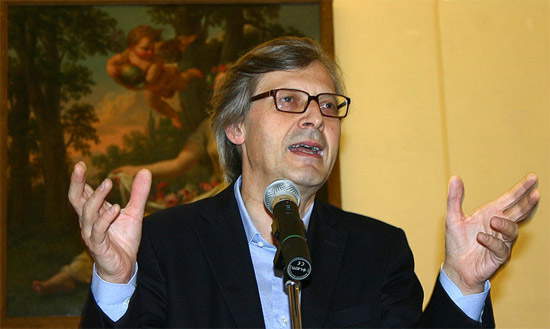Perhaps it is not yet the case that we prefer Vittorio Sgarbi in the guise of a “mover of works of art,” as Tomaso Montanari recently called him, but we can certainly say that, as a polemicist, good Vittorio seems to lack the refinement that such a delicate role should require. And I am not just referring to the manners of our tenacious chastiser, which have little to do with it this time: I am referring to the contents of his latest, picturesque stunt, namely the petition to prevent “the abusive export of Italian masterpieces.” Now, given that all legal and legislative instruments exist to prevent Italian masterpieces from illegally escaping national borders, and given that the task of combating such crime belongs to the competent authorities, the only sense that the undersigned would be able to attribute to the Sgarbian signature-gathering might be to raise public awareness on a matter of grave importance.
However, even if the goal were, as I hope, to raise awareness, I believe that the worst way to achieve it is precisely to point, as Sgarbi does, one’s agitated finger at a small group of university professors, and to forget that there are already laws identical to those desired. Let’s assume that it is true that the various Caglioti, De Marchi, Tanzi, Pizzorusso, Romano, Bentini, Morselli and especially Benati (against whom Sgarbi has a lot to harp on) have “humiliated their role as public officials” and “lent their prezzolous labor to art dealers”: we should first assume that all their universities have accepted that the above-mentioned held positions in open conflict of interest with their public role, and this in defiance of all laws on employment in the public service. Or, that the faculty members held illicit consulting positions without the knowledge of their universities. However, common sense leads me to believe that all the scholars mentioned by Sgarbi acted in full compliance with the rules: which, translated, means that the aforementioned ones submitted a request for permission to their universities in order to receive permission to hold an external position, and that the universities, having ascertained the lack of conflict of interest, issued the permission.
But even assuming that all of them acted in the most miserable, bleak and total illegality, it is not clear what concrete relationship, according to Sgarbi, links the scholars’ expertise to the illicit export of the works. In fact, when Sgarbi calls Benatian "illicit exporter of works of art," he is not only risking a libel suit, but he is also affixing to the scholar a role quite different from the infinitely softer (and above all lawful) role of the expert who signs an attribution of a painting. And this is what Sgarbi charges the professors with: having signed appraisals on paintings in private possession. Well, it would be quite interesting to know what is the legal case that makes an appraiser who signs an attribution complicit in an abusive exporter: because the one who abusively exports a work is not the one who signs an appraisal thus giving an opinion on its value, but the one who owns the work and therefore decides which channels to have it taken. And, of course, in case the owner of the work has shady intentions, the scholar who has appraised the masterpiece, unless he is endowed with the power to read other people’s thoughts (or unless he contributes to getting the work out of Italy by attributing to it a value much lower than its real value: but these would not be the cases mentioned by Sgarbi, so much so that even he does not write this clearly in his petition), is not required to know what the owner wants to do with his property.
 |
| Vittorio Sgarbi. Photo by Giovanni Dall’Orto |
It should be remembered, however, that the Italian state possesses several tools to stop, or at least reduce, attempts at illicit exportation: starting with that same right of pre-emption that Sgarbi would like to make the subject of European legislation. Well, in Italy the right of pre-emption for cultural goods recognized as being of public interest already exists. What does it mean? It means that when there is a transfer of a work of art to which the state attributes considerable interest, the state itself, according to the Code of Cultural Heritage, can exercise the right of pre-emption, that is, put in very banal terms, it can avail itself of a priority over other potential buyers interested in the same good, and this “priority” lasts sixty days from the moment when the owner’s intention to transfer the work is made known.
One might therefore ask: how does the state know which works are being divested, and therefore how does it know which works it can exercise its right of first refusal on? The Cultural Heritage Code provides for two important institutions: the declaration of cultural interest and the declaration of transfer. The former, formulated by the superintendency, determines whether an asset has “artistic, historical, archaeological or ethnoanthropological interest,” based on the guidelines of the Ministry of Cultural Heritage. When a property is subject to such a declaration (...vulgarly, when a property becomes “notified,” because the declaration is followed by a notification to the property owner), disposals must be reported to the state. And that, then, is what the notification of transfer is: an act through which the owners of an asset make explicit to the Ministry of Cultural Heritage their intention to transfer their work. In addition, a notified property cannot be moved outside national borders without specific authorization. And the funniest thing about Sgarbi’s petition is that those who commented also include several people who complain that this process is too cumbersome, takes an inordinately long time, and restricts the freedom of movement of dealers and collectors.
True commodification is not what Sgarbi understands, since the buying and selling of works of art has always existed, and the works that are on the market are objects that, like it or not, have an intrinsic commercial nature: commodification, that is, the reduction to an object of exchange of goods that in themselves should not be, is what affects the public heritage often sold off for pennies on occasions with meager and ephemeral returns (when present, of course), or transferred, exposed and thus subjected to risks in order to celebrate the cultural ambitions of shows and events that in reality treat art as a luxurious decorative frill, as a mere scenic apparatus. All this while various public properties run toward degradation in general disinterest: just to give a few examples, if certain administrations had been more shrewd, the Boldrone Tabernacle in Florence would not have been turned into a dustbin, the Girolamini Library in Naples would not have been despoiled of its assets, and there would have been no room for figures such as Marcello Dell’Utri, he indeed an avowed illegal exporter of works of art abroad, obviously assuming that the charges brought against him by the investigators are confirmed at all levels of justice.
Sgarbi’s initiative is, therefore, laudable in its intent to bring attention to an issue that should call us to greater care for our historical and artistic heritage. But in my opinion his good intentions make use of arguments that are to be reviewed almost in their entirety: what should be questioned should not be the role of university professors who have held advisory positions, I imagine with the authorization of their universities. Rather, we should ask ourselves whether we are all doing enough for our heritage.

The author of this article: Federico Giannini
Nato a Massa nel 1986, si è laureato nel 2010 in Informatica Umanistica all’Università di Pisa. Nel 2009 ha iniziato a lavorare nel settore della comunicazione su web, con particolare riferimento alla comunicazione per i beni culturali. Nel 2017 ha fondato con Ilaria Baratta la rivista Finestre sull’Arte. Dalla fondazione è direttore responsabile della rivista. Nel 2025 ha scritto il libro Vero, Falso, Fake. Credenze, errori e falsità nel mondo dell'arte (Giunti editore). Collabora e ha collaborato con diverse riviste, tra cui Art e Dossier e Left, e per la televisione è stato autore del documentario Le mani dell’arte (Rai 5) ed è stato tra i presentatori del programma Dorian – L’arte non invecchia (Rai 5). Al suo attivo anche docenze in materia di giornalismo culturale all'Università di Genova e all'Ordine dei Giornalisti, inoltre partecipa regolarmente come relatore e moderatore su temi di arte e cultura a numerosi convegni (tra gli altri: Lu.Bec. Lucca Beni Culturali, Ro.Me Exhibition, Con-Vivere Festival, TTG Travel Experience).
Warning: the translation into English of the original Italian article was created using automatic tools. We undertake to review all articles, but we do not guarantee the total absence of inaccuracies in the translation due to the program. You can find the original by clicking on the ITA button. If you find any mistake,please contact us.